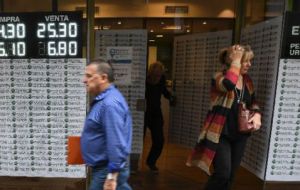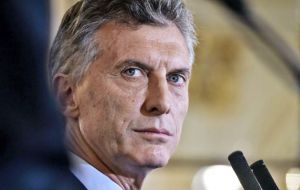MercoPress. South Atlantic News Agency
Argentina's “L” Day challenge: US$ 25bn in Peso bonds mature on Tuesday
 On Tuesday holders of Lebac Peso-denominated bonds issued by Argentina's Central Bank are maturing, sparking a potential US$ 25 billion payout
On Tuesday holders of Lebac Peso-denominated bonds issued by Argentina's Central Bank are maturing, sparking a potential US$ 25 billion payout  Currency exchange values are displayed on the buy-sell board of an exchange business in Argentina, where the peso has plummeted to a new low
Currency exchange values are displayed on the buy-sell board of an exchange business in Argentina, where the peso has plummeted to a new low  Macri last week began negotiations with the IMF requesting an aid package to stem the currency run, of allegedly US$ 30bn.
Macri last week began negotiations with the IMF requesting an aid package to stem the currency run, of allegedly US$ 30bn. The Argentine Peso plummeted to a new low on Monday despite government attempts to curb losses in recent weeks by hiking interest rates and shedding billions in foreign reserves. The Peso fell sharply on opening Monday and closed down 6.2%, trading at 25.52 against the dollar, having lost close to 33% so far this year.
The new losses come at an ominous moment: on Tuesday, holders of Lebac Peso-denominated bonds (“L”) issued by Argentina's Central Bank are maturing and allowed to demand settlement -- sparking a potential US$ 25 billion payout. However under the latest raft of measures financial institution are only allowed to hold 10% reserves in US dollars.
Macri last week began negotiations with the International Monetary Fund requesting an aid package to stem the currency run, of allegedly US$ 30bn. However the IMF spokesperson said on Monday that an informal meeting on the issue will be held next Friday, 18 May.
“This will be an informal meeting as part of our usual process of briefing the Board on negotiations for high access IMF programs,” Gerry Rice said in a statement.
It means a decision on Buenos Aires' request is unlikely to be made this week. The amount and terms of the loan will still have to be discussed. Likewise the IMF spokesperson said the Fund had not discussed any specific target for the exchange rate with Argentine authorities during negotiations in Washington.
“Argentina has a floating, market-determined exchange rate, and we fully support that,” the spokesman said. “The exchange rate should continue to be determined by market forces, with the central bank continuing to use all the policy tools that are at its disposal.”
Argentina is seeking a high access “stand by” financing arrangement that would provide funds above the normal loan amount. Finance minister Luis Caputo advanced that besides the IMF package, Argentina will receive extra support from the World Bank, Inter-American Development Bank and the region's Financial Corporation.
As US interest rates rise, investors in recent weeks have been fleeing developing countries and in the particular case of a vulnerable Argentina, driving up demand for US dollars, and driving the Peso down.
Monday's drop means the currency has devalued by 20% in the last six weeks, despite efforts by the central bank to prop up its value, burning through more than US$ 8 billion in reserves and hiking the benchmark interest rate to 40%. Argentine economists now believe the central bank will push interest rates to as high as 50% to protect the Peso.
After taking office in December 2015, the market-friendly Macri floated the Argentine peso, ending the strict controls in place under the government of Cristina Kirchner.
With a budget deficit of almost 10% of GDP inherited from the populist years of the Kirchner couple, Macri's government has struggled to halt inflation, which soared to 25% in 2017. Talks with the Washington-based lender come 17 years after the country last defaulted on its debt and 12 years after it cut ties with the IMF.
The IMF negotiations carry political risks for President Macri and his reelection plans for 2019. Many Argentines blame IMF-backed policies of the late 1990s for the country’s 2001-2002 economic meltdown. Some opposition politicians and activists have voiced concerns that the IMF deal being drawn up in Washington will require painful fiscal belt tightening.
According to pollsters CEOP, Macri has only 37% support among Argentines, the lowest ranking of his presidency. “We have to take into account that the collective memory feeds on the bad memories associated with the dreaded IMF,” said Roberto Bacman, CEOP's director.




Top Comments
Disclaimer & comment rules-

-

-

Read all comments@jo
May 15th, 2018 - 04:33 pm +2Actually the last default was in 2014, and the next one is coming right up.
News for 31 July 2014:
“Argentina's bonds and stocks fell sharply in trading Thursday as the country slid into default on its international debt for the second time in 13 years.”
http://www.latimes.com/nation/la-fg-argentina-defaults-20140731-story.html
Naturally, reekie doesn't know a default from a hole in the ground.
May 15th, 2018 - 06:01 pm +2If the post doesn't deliver your cheque, reekie, you still have a non-payment event and you are still in default.
BBC 31 July 2014: “Unfortunately, no agreement was reached and the Republic of Argentina will imminently be in default,” Daniel Pollack, the court-appointed mediator in the case, said in a statement on Wednesday evening. '
1 Aug 2014: ”The International Swaps and Derivatives Association (ISDA) on Friday declared Argentina in default, which could trigger payments worth up to $1 billion on credit default swaps.ISDA's 15-member determinations committee decided that a “failure to pay” event has occurred on the contracts on July 30, the day Argentina missed a coupon payment on some of its restructured foreign-law bonds.“
Even the Chinese bond rating agency was pretty clear about Argentina falling into default in 2014.
It seems that only argentines were unaware, or rather, those who believed the kirchnerist pap that the country was not really in default.
Media in Argentina in 2014 recognised the default:
”El default, la recomendación de los abogados argentinos“
”Technically” (since reekie seems to like the word) Argentina was STILL in default in 2016 and I think it still is, due to additional nonpayment events that constitute default. Véase
Argie media mid-2016: “Pagan US$ 2.500 millones de cupones que estaban en default”
There will always be reekies who don't understand this stuff.
Marti
May 15th, 2018 - 05:17 pm +1Yes, you are quite correct. It never felt like the previous default though and many tried to argue it was nowhere as significant. I still think of the previous one because I’ll never forget what my friends described. In 2014 they were ready for it I suppose but seemed to get through it much more easily. I remember them telling me about caps on bank withdrawals but I’m not sure they still had much money in the bank TO withdraw.
Commenting for this story is now closed.
If you have a Facebook account, become a fan and comment on our Facebook Page!